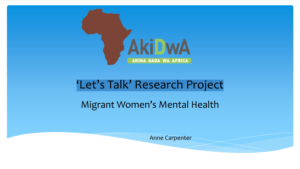The Interplay of Gender and Mental Health: A Global Health Issue
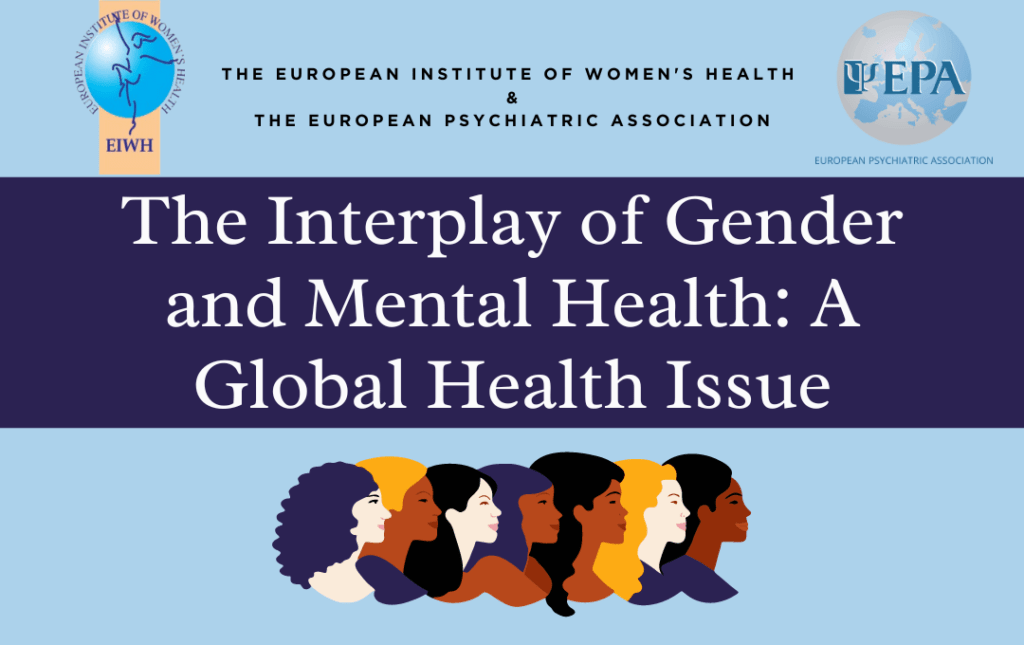
This webinar was jointly organised by the European Institute of Women’s Health and the European Psychiatric Association, and co-hosted by Deirdre Clune (MEP). Globally women are at a higher predisposition for mental health conditions such as anxiety and depression. This webinar explored the mental health challenges faced by women across the globe and discussed opportunities to improve mental health outcomes whilst being mindful of gender-specific factors. This webinar brought together a diverse range of experts to synthesise key evidence, discuss important issues and make concrete recommendations on how access to healthcare, targeted healthcare supports and services, and gender equity must work in synergy to improve the mental health and wellbeing of everyone, everywhere.
🗓️ Date: 12/09/23
⏰ Time: 10.00 – 11.30 (CEST)
📍 Location: Online – Zoom
💸 Cost: Free
Photos
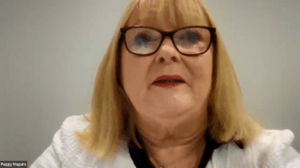
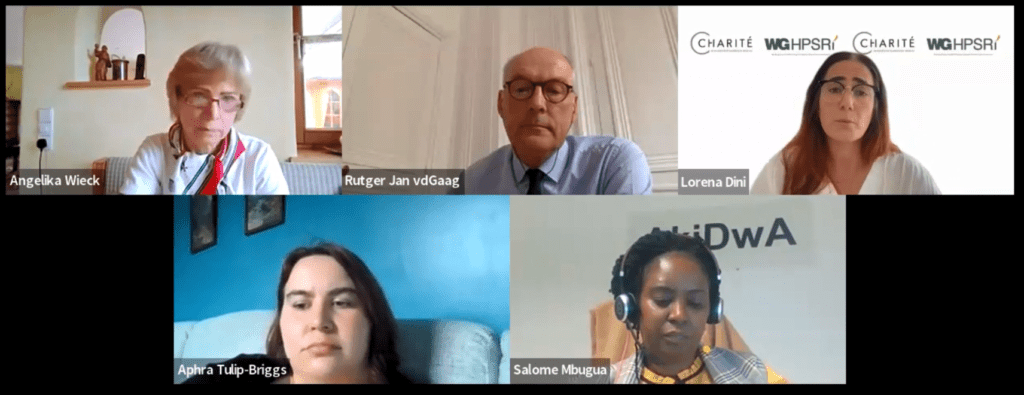
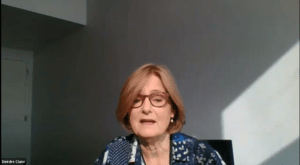
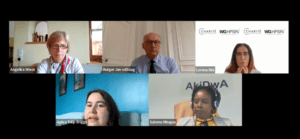
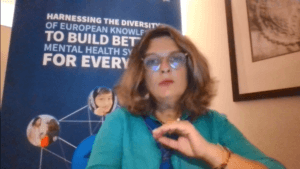
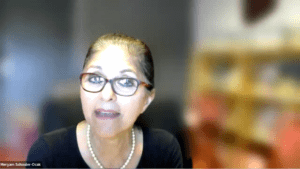
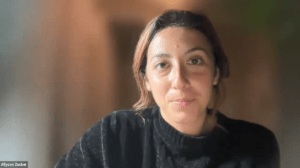
Presentations
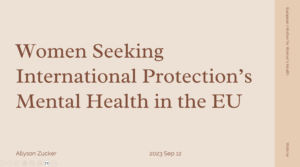 Women Seeking International Protection’s Mental Health in the EU
Women Seeking International Protection’s Mental Health in the EU
Allyson Zucker
Resources
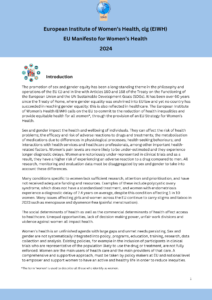 EIWH 2024 Manifesto for Women’s Health
EIWH 2024 Manifesto for Women’s Health
The European Institute of Women’s Health (EIWH) calls on the EU to commit to the reduction of health inequalities and provide equitable health for all women, through the provision of an EU Strategy for Women’s Health.
This manifesto outlines the need for action on women’s health and provides key facts and figures on the current state of play for women in the EU. It targets important policy areas for improving the health and wellbeing of women across the life-course.
‘Let’s Talk’ Research Project: Mental Health Experiences of Migrant Women
Anne Carpenter
AkiDwA
Agenda
| Time | Title | Speaker |
|
10:00 – 10:05 |
Welcome |
Peggy Maguire, EIWH |
|
10:05 – 10:10 |
Opening remarks |
Deirdre Clune, MEP |
|
10:10 – 10:20 |
Keynote speaker |
Ledia Lazeri, WHO |
|
10:20 – 11:20 |
Panel discussion moderator |
Rutger Jan van der Gaag, EIWH/EPA |
| Panellists |
Aphra Tulip-Briggs, Rethink Mental Illness/GAMIAN |
|
|
Salome Mbugua, AkiDwA |
||
|
Angelika Wieck, EPA |
||
|
Lorena Dini, Charité Berlin |
||
|
11:20 – 11:25 |
EIWH Mental Health Research Report |
Allyson Zucker, LSE |
|
11:25 – 11:30 |
Summary and closing remarks |
Meryam Schouler-Ocak, EPA |
Speakers
 Deirdre Clune
Deirdre Clune
Deirdre Clune is a Member of the European Parliament for the constituency of Ireland South, having been elected in 2014 and re elected in 2019. She is a full member of the Parliament’s Committee on Internal Market and Consumer Protection and a substitute member of the Environment, Public Health and Food Safety.
Deirdre is a former member of the Dail Eireann (1997-2002, 2007-2011) and Seanad Eireann (2011-2014). She was elected Lord Mayor of Cork City in 2005, in which time the City was designated as the European Capital of Culture.
During her time in Leinster House, Deirdre was Deputy Spokesperson on Enterprise with the Special Responsibility for Innovation. She was also the Fine Gael spokesperson on Environmental Information and Protection, and Arts, Heritage, Gaeltacht and the Islands.
|
“Mental health is influenced by biological factors, such as genetics, but it’s also critically shaped by social factors, including poverty, gender based violence, ethnicity, sexual identity, disability and other risk factors. Gender awareness should be embedded in mental health policy – from research and data collection, to health care worker education and training. We must ensure that all women, no matter their age or background, have access to gender sensitive mental health services wherever they live. We need to create awareness of the impact of sex and gender on mental health for women and girls across all healthcare settings.” – Deirdre Clune |
 Ledia Lazëri
Ledia Lazëri
Dr Ledia Lazëri has been the Regional Adviser for Mental Health at the WHO Regional Office for Europe since May 2021. A native of Albania, she trained and worked as a psychiatrist in her home country, contributing to the education of medical students and later to the national reform of mental health policy and services. Having joined WHO in 2000, Dr Lazëri expanded her scope of work beyond the Balkans region through her work in the Mental Health Project of the Stability Pact in South Eastern Europe and later in Turkey, where she led a large EU-funded WHO project on Improving Services for People with Disabilities.
She took up duties as Regional Adviser in May 2021, after serving as the WHO Representative to various European countries, where she led the WHO technical cooperation. In her function as Regional Adviser, Dr Lazëri leads a team that brings together expertise in various areas: policy and services, rights and advocacy, communication and promotion in mental health, tasked, among others, with implementing the WHO European Framework for Action in Mental Health 2021-2025 and with supporting the pan-European Mental Health Coalition.
 Meryam Schouler-Ocak
Meryam Schouler-Ocak
Professor for Intercultural Psychiatry and Psychotherapy, additionally, specialist for neurology, psychotherapy, particularly in trauma focused psychotherapy and in EMDR therapy. She is chair of Research Unit on Intercultural Migration and Care Research, Social Psychiatry at Charité, Universitätsmedizin Berlin.
Prof. Schouler-Ocak received the Order of Merit by the Federal Republic of Germany 2014. In 2022, it was awarded “In recognition of her ground breaking contributions to Cultural Psychiatry” from the World Association of Cultural Psychiatry (WACP).
Prof. Schouler-Ocak is board member of European Psychiatric Association (EPA); chair of Committee on Ethical issues of the EPA; chair of Section on Transcultural Psychiatry of the World Psychiatric Association (WPA-TPS) and board member of the World Association of Cultural Psychiatry (WACP). She is also chair of the Section of Intercultural Psychiatry and Psychotherapy, Migration of the German Association for Psychiatry, Psychotherapy and Psychosomatics (DGPPN) and President of the German-Turkish Association for Psychiatry, Psychotherapy and Psychosocial Health (DTGPP). Prof. Schouler-Ocak also is board member of the European Institute of Women´s Health (EIWH).
Since 2020, she has been the chair of the working group on “Providing mental health care for migrants and refugees” (WG for the Action Plan 2020 – 2023 of WPA). Her research interests focus on intercultural psychiatry and psychotherapy, trauma and their related disorders, mental health and healthcare of immigrants, refugees, asylum seekers and ethnic minorities, suicidality and diversity as well as ethics in psychiatry.
 Salome Mbugua
Salome Mbugua
Dr. Salome Mbugua is a researcher, gender equality activist and human rights advocate. She is the CEO of AkiDwA – The Migrant Women’s Network Ireland and founder of Wezesha, the Africa diaspora development organisation.
Her professional experience spans over 20 years of work experience in civil society working with under represented groups in particular women, children, and the youth of Europe and Africa. Dr Mbugua serves as a human right commissioner with Irish Human Rights and Equality Commission.(IHREC)
Her continuous belief in equality and justice has shaped her career, leading to engagement with policy makers across Ireland, Europe and at International levels. Dr Mbugua serves at various advisory committee, expert groups and boards in Ireland and European levels. She sits on the EU expert group on economic migration. In Sept. 2018 she was appointed by the Tánaiste to chair the working group developing Ireland’s 3rd National Action Plan on Women, Peace and Security. She also serves as Chair of Equality Diversity & Inclusion project board with Public Appointment Services. She is a member and convener of the steering committee of people of African descent, working with the Irish government to implement the international decade for people of African descent in Ireland. She is 2015 OHCHR-UN Fellow and the 2010 Eisenhower Fellow. Dr Mbugua holds a doctorate from Trinity College, Dublin and a master’s degree from UCD, Dublin.
 Aphra Tulip-Briggs
Aphra Tulip-Briggs
Aphra joined Rethink Mental Illness Board of Trustees in February 2018 and in 2021 was appointed as a 2cnd Vice-chair. She is a carer of family members who live with mental illness and have used mental health services for a number of years. She is particularly passionate about using the experiences of people affected by mental illness to input directly to the development of such services. Over the past 15 years, she has worked in various roles at NHS cancer services and the University of Warwick, U.K., medical school.
|
“Mental Illness and Gender identity are topics at the forefront conversations people are having but not enough work is done to connect the two. There needs to be more co-produced research Identifying early interventions that support the whole individual.” – Aphra Tulip-Briggs |
 Angelika Wieck
Angelika Wieck
Following psychiatric training, a lecturership and research on biological and psychosocial aetiological mechanisms in postnatal bipolar illness triggered at the South London and Maudsley Hospital and the Institute of Psychiatry Psychology, and Neuroscience, Dr Wieck was Consultant in General Adult Psychiatry and the Specialist Affective Disorders Service in the Greater Manchester Mental Health NHS Foundation Trust, the Lead Consultant for the North West Perinatal Psychiatry Service, Clinical Lead for the Perinatal Mental Health Clinical Network in Greater Manchester and Eastern Cheshire, and a member of the National Clinical Reference Group for Perinatal Mental Health. Currently, she is Honorary Perinatal Consultant Psychiatrist at the Greater Manchester Mental Health NHS Foundation Trust, and Honorary Senior Lecturer at the University of Manchester.
Dr Wieck has been lecturing nationally and internationally on reproductive psychopharmacology for many years and was Expert for the Valproate Bipolar Advisory Group of the European Medicines Agency. Dr Wieck has been the Chair of the Women’s Mental Health Section of the European Psychiatric Association for many years and serves on the Editorial Board of European Psychiatry and the Archives of Women’s Mental Health. Her research and publications are in reproductive psychopharmacology, psychoneuro-endocrinology and perinatal psychiatry.
 Lorena Dini
Lorena Dini
Lorena Dini, MD, MScIH, HCM, PhD graduated as a medical doctor and, after gaining clinical experience in Primary Care, she obtained a Master of Science in International Health and a PhD from the Charité – Universitätsmedizin Berlin where in 2017 she established the Working Group on Health Policy and Systems Research and Innovation (AG HPSRI) at the Institute of General Practice. As a senior researcher, she is dedicated to improving the health system by designing and implementing innovative research projects with an action-oriented, real-world approach linking health policy, research, and practice. In the last 5 years her focus of her research has been on women’s health with particular focus on women 50+ currently expanding to the design of gender responsive health care and gender sensitive research and the connection between women’s health and one health and promoting integrated, multidisciplinary coordinated care.
Dr. Dini currently holds several board positions in European organizations. She is elected Vice-president of the Section Health Services Research of the European Public Health Association (EUPHA-HSR) an elected member of the Advisory Board and PRIMORE Research Board of the European Forum for Primary Health Care (EFPC), member of the Working Group on Economic Evaluation in Healthcare in Europe (EEHE Working Group) of the Association of Schools of Public Health in the European Region (ASPHER), member of Women in Global Health (WiGH) and a Fellow of the Sciana Health Leaders Network.
 Peggy Maguire
Peggy Maguire
A political ssientist, Peggy Maguire has worked at the international, regional and national levels for over 25 years highlighting the needs for gender equity in biomedical research, public health and social policy. Prior to her role as Director General of the EIWH, Peggy was Director of Development at the National Maternity Hospital, Dublin and a former Director of the Research and Education Foundation at the Irish College of General Practitioners.
An advocate for a more health literate public, in 1995, Peggy initiated and helped develop a cancer communication and information initiative by and for women to help ensure cancer information was led by women in this then new information age. As part of her commitment to gender equality, Peggy has been a member of the WHO expert group on gender mainstreaming and has contributed to the WHO Women’s Health Strategy for Europe. In 2014 Peggy worked on amendments to the Clinical Trials Regulation to ensure the inclusion of both gender and age that would also include the perspectives of wmen.
Peggy is a former President of the European Public Health Alliance (EPHA). She has initiated and contributed to many EU projects including an Engender-Inventory of good practices in Europe for promoting gender equity in health; Engendering Research Ethics Committees (RECs) and EUGenMed, leading the research and workshop for the inclusion of Sex and Gender in Healthcare’s Professional Education.In 2019, the Minister for Health, Ireland appointed Peggy as co-chair of the Women’s Health Task Force.
Peggy’s research and advocacy work has been seen to support gender equity, ageing, patient and disability rights as well as the implications of social determinants on health and wellbeing. In October 2021, the WHO Academy Quality Committee appointed Peggy to its Board and as Chair of their Patient and Community Engagement (PACE) working group.
 Rutger Jan van der Gaag
Rutger Jan van der Gaag
Rutger Jan van der Gaag is an emeritus professor of psychiatry (child and adolescent) at Radboud University Medical Center, and is the Vice Chancellor of the Radboud University in Nijmegen NL.
His research and clinical work focused on developmental disorders (autism ADHD addiction) throughout the lifespan and on gender sensitive medicine and psychiatry. His publications include 77 international scientific publications, more than 200 Dutch publications and chapters in books, recently several on Gender Sensitive Medicine.
He supervised many PhD theses amongst which Gender, Comorbidity & Autism, Patricia JM van Wijngaarden-Cremers (2015).He is professor of psychosomatics and psychotherapy at the Stradinš University in Riga (Latvia) and Member of the Academy Nationale de Medicine (Paris).He is honorary president of the Netherlands Psychiatric Association and immediate past President of the Royal Dutch Medical Association.
He served as Vice-President of the Standing Committee of European Medical doctors CPME, and past board member of the European Psychiatric Association.He is secretary of the Netherlands Alliance for Gender and Mental Health since 2019, and has joined the Board of then European Institute of Women’s Health EIWH in 2023.
 Allyson Zucker
Allyson Zucker
Allyson Zucker is a researcher at the London School of Economic’s (LSE) Care Policy and Evaluation Center (CPEC), that focussed on long term care (social care), mental health, and integration policy.
She recently completed her MSc in Health Economics at LSE, focusing on women seeking international protection’s mental health in the EU in partnership with EIWH and EPA. In 2016, she received her BA in Classical Studies at the University of Pennsylvania, and BS in Operations, Informations, & Decisions at the Wharton School.
Before LSE, during her time at McKinsey & Company, she supported provider, payor, and government clients in strategic planning and operational management, such as by designing behavioural health strategies for payors, enhancing diversity and inclusion efforts in government programs, and improving emergency room efficiency at national health systems.
Subsequently, at Bright Health Group, she partnered with the primary care clinical team to design an integrative operating model for individuals covered by the US’s Affordable Care Act, incorporating physical and mental health with social determinants of health.


